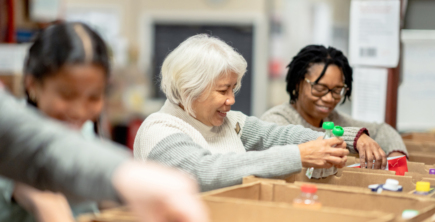
Corporate Partners
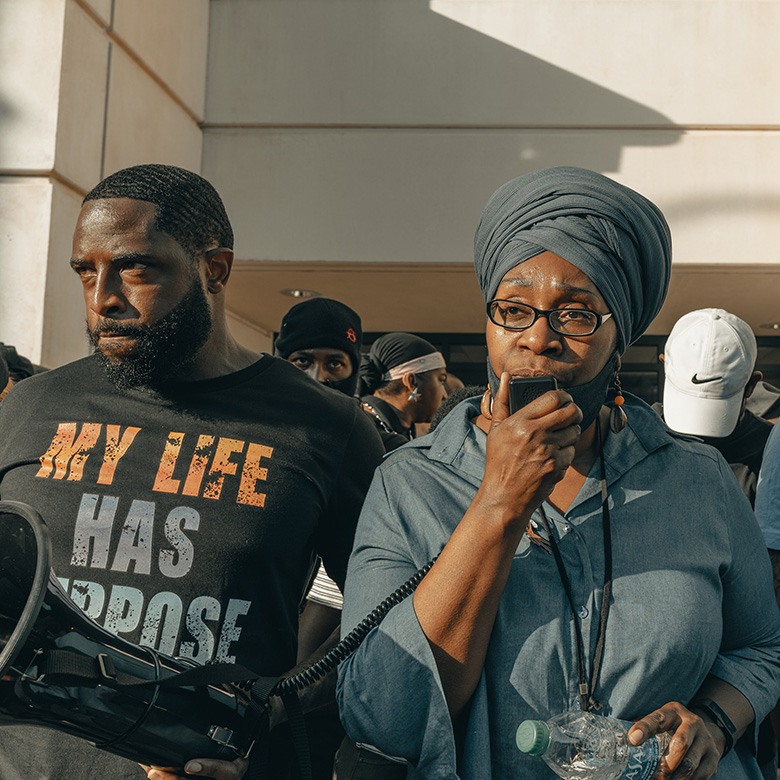
We may look back upon 2020 as the year that the masses finally realized the deep irony of calling the 50 states of America “United.” Since the violent dawn of the nation, we’ve never truly been united. The most apparent and severe threats to our unity have been inflicted by white communities, starting in the U.S. with the enslavement of Africans and the displacement of Indigenous people.
These chasms are now more apparent than they’ve ever been in most any living person’s time due to what we’re experiencing today: a global pandemic alongside heightened awareness and action against anti-Black racism.
George Floyd’s death was horrific, but we’ve seen these kinds of deaths before, even on camera. Living in a global health pandemic has created this moment. If George Floyd’s murder had happened a year ago, I’m not sure the moment would have happened.
Throughout the course of American history, countless Black activists—grounded in a deep faith that a better world is possible and committed to working toward that better world—have called for systemic transformation and the treatment of all Americans as if we were truly created equal. The pairing of belief and personal investment is one of the strongest threads that weaves together the testimonials from four Black leaders, including two from social venture projects at Tides who have received funding through Tides’ Stronger Together COVID-19 Fund. This fund supports their work as they navigate simultaneous and intersecting pandemics: COVID-19 and systemic anti-Blackness.
The current moment is not an awakening for Americans who haven’t had the luxury of being removed from the damaging daily realities of anti-Black racism. Sheryl Lane, executive director of Building Blocks for Kids (BBK), says her commitment to community development emerged organically from her lived experience growing up in Richmond, California. It was there that she noticed and grew curious about the disparities between different communities, particularly as they impacted Black communities.
From Lane’s perspective, “The circumstances for us have not changed; it’s not an awakening for most Black people. George Floyd’s death was horrific, but we’ve seen these kinds of deaths before, even on camera. Living in a global health pandemic has created this moment. If George Floyd’s murder had happened a year ago, I’m not sure the moment would have happened.” It’s no surprise, then, that COVID-19 is disproportionately impacting Black Americans.
If what I have to say makes you uncomfortable,” she says, “well, I’ve been uncomfortable my whole life.
Kenyatta Leal, reentry director at Next Chapter, also sees the exacerbation of pre-existing conditions rather than a different or new challenge to face. Leal’s area of focus is the prison system, where folks in already-dire circumstances are now made more vulnerable by the intersection of the violence of mass incarceration and the heightened threat of a deadly virus, given the unsafe conditions imposed on them. Black Americans are severely overrepresented in prisons; the 2010 census reported that despite being 13 percent of the country’s population, Black people account for 40 percent of Americans behind bars.
Leal shares that San Quentin, where he spent nine years of a 25-to-life sentence before being released in 2013, was in relatively good shape concerning COVID-19 before the Department of Corrections decided to send a busload of sick people from Chino to San Quentin. This resulted—unsurprisingly—in an outbreak. Nearly 35 percent of people in custody have tested positive for COVID as of mid-July. “Friends and people I care about are facing a death sentence right now. They’re stuck in their cells, can’t social distance, have no personal protective equipment, and are living with pre-existing conditions,” says Leal. He emphasizes the crucial point that regardless of why they’re in prison, no one deserves to have their life taken through negligence and intentional decisions that put them even more severely in harm’s way.
Before COVID-19 and before the unjust police murder of George Floyd, Executive Director of Bay Area Regional Health Inequities Initiative (BARHII), Melissa Jones, had long been thinking about “co-occurring disasters” that result from racism and income inequities. This “moment” did not happen spontaneously or magically.
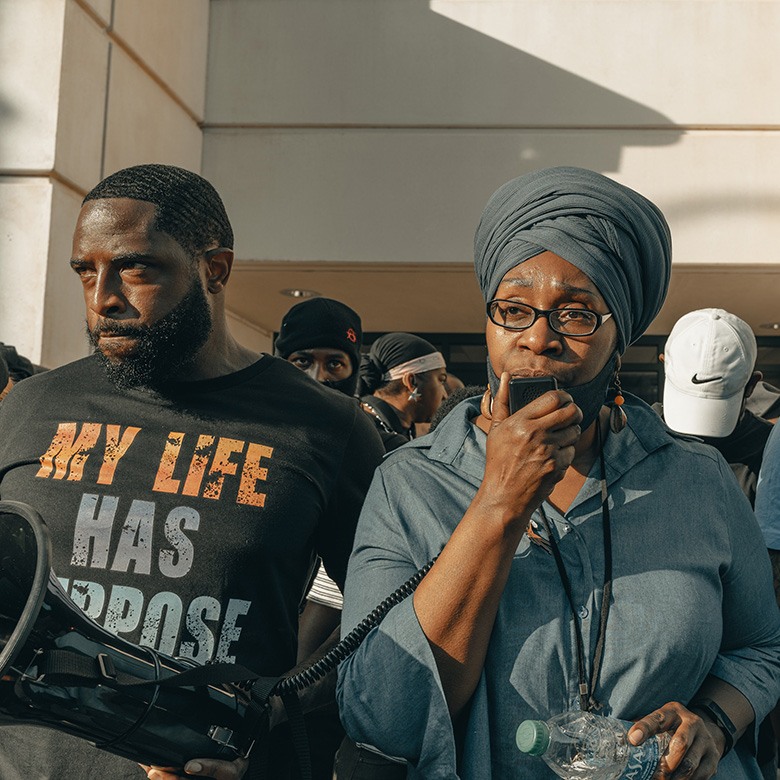
Image © Clay Banks
“A lot of people have been doing a lot of work for a long time,” Jones shares. Policy proposals that have been able to move quickly, such as the eviction moratorium in California and the removal of police from Oakland Unified School District, have been built on campaigns that have been pushing over time. “It’s important to note,” adds Jones, “things that are just as useful to this time and didn’t have as much coalition behind them, or had coalitions that had more difficult relationships with power, are still struggling in many ways.”
So what is new about this moment? Ty-Licia Hooker, Oakland native and executive director of Boost! West Oakland, is experiencing a renewed commitment to letting her voice be heard. “If what I have to say makes you uncomfortable,” she says, “well, I’ve been uncomfortable my whole life.” Similarly, Lane feels compelled to call out all sectors for their involvement and complicity in anti-Blackness. In a powerful message she shared with the BBK community, Lane wrote, “I must admit I am cynical about the pledges of solidarity and calls for justice when what is necessary at this moment is transforming personal bias, prejudice, blatant racism, terror, and systems that have existed for centuries.”
Symbolic allyship, even when well-intended, is precisely that—symbolic, but absent of any real transference of power. This moment is calling for more than broad statements, hashtags, one-time donations, or occasional volunteer hours. Though these micro and “bottom-up” actions are worthy and necessary, we must also look to transform the embedded ideologies, sociocultural norms, and policies that led us here. And in order to move in this direction, we need more people who hold power and privilege to take responsibility for getting us there.
In his foreword to Toni Morrison’s 2017 book “Origin of Others,” Ta-Nehisi Coates writes, “In America, part of the idea of race is that whiteness automatically confers a decreased chance of dying like Michael Brown, or Walter Scott, or Eric Garner. And death is but the superlative example of what it means to live as an ‘Other,’ to exist beyond the border of a great ‘belonging.’”
This moment is calling for more than broad statements, hashtags, one-time donations, or occasional volunteer hours.
Jones is in the fight to remove the predictability of inequitable outcomes that Coates is pointing to, and she knows that in order to get there, “We have to be concerned with helping more people to see what’s ‘beneath the iceberg.’” Part of what too many Americans blind themselves to is the fact that Black bodies were the first form of capital in the economic system that we still employ today. Our continued engagement with the system that was built on the commodification of Black life has led to an embedded perception in the American psyche that Black people are objects through which whiteness makes sense of itself. This is a root problem that needs to be dissolved.
“If we really decide we want to overcome racial disparities,” Leal emphasizes, “we have to look at our history. We need truth and reconciliation in this country, but you can’t get true reconciliation without getting to the truth. We’ve distorted history, so we have to get back to the truth.”
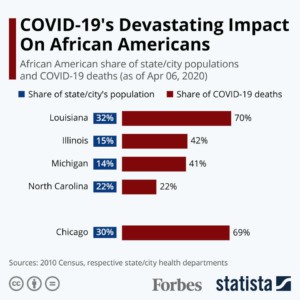
© 2020 Forbes and Statista
Leal states the truth plainly: “Cop killings are 21st century lynchings. And the indifference we see is something we need to address. We need a level of empathy that we haven’t seen before.” Such empathy is obstructed by the false borders that we’ve created between different groups of people—including the prison walls that separate our incarcerated brothers and sisters from those of us outside of those walls. These imposed separations prevent us from understanding the interconnectedness of our realities.
Leal reminds us that these perceived separations are false, saying, “What people fail to realize is that what’s inside prison walls comes out. This is all a part of the community. It’s not just the people that live there that are impacted; it’s the people that work there, everybody that goes in there. It’s not a left or right thing. It’s not a Black or white thing. It’s a humanity thing.”
True allyship has to incorporate this belief that we are all connected as one human race, that the suffering of our neighbors is often a direct result of the privileges that some of us hold and often horde. Part of what can get us closer to transformative change is coalition building, which Leal advocates for, encouraging aspiring allies to identify and collaborate with organizations already doing the work. Hooker points to the activism of actress Jane Fonda as a great model for how potential allies can engage across difference. She says, “Allies should study how Fonda leveraged her privilege to support the movement of the Black Panther Party.”
True allyship has to incorporate this belief that we are all connected as one human race, that the suffering of our neighbors is often a direct result of the privileges that some of us hold and often horde.
Hooker lifts up the powerful idea of being a “white shield” as a literal and metaphorical way for white people to be in the fight for justice. This term has gained some traction as a result of white people at protests creating literal barriers between Black protesters and the police. Hooker calls for non-Black people and white people in particular to “radically stand in the face of oppression and white supremacy, and say, ‘Stop. You will not cause this harm to my Black brothers and sisters, and if you think about causing harm, then you’re going to harm me first, because I will not allow this to happen.’” To do this at a protest is one very tangible way to shield Black community members, but there are countless other ways in our daily lives to apply the same tactic.
Hooker emphasizes the importance of listening to your gut when something seems off and speaking up rather than leaving it to Black people or to anyone else.This type of allyship has to happen when Black folks are present, as well as when we’re not. Allyship isn’t something to be paraded.
Jones has a simple and clear directive for all of us to use as a guide for our activism: “Less through statements, more through actions.” She clarifies further, “Getting to action is about working around the barriers. Don’t be deterred easily. We need a willingness to ride the waves of what it takes to get something done.”
The deep sense of hope embedded in the noble efforts of these leaders comes through in Jones’s reminder. “History gets taught to us as if where we are today was inevitable,” she says. “And it’s not. There are choices ordinary people made every day that moved us to where we are.” She highlights the importance and impact that our everyday choices can have and poses a powerful set of guiding questions to help us all get clear about how we might move forward, relative to both the pandemic of anti-Black racism and the coronavirus: What are the compromises you’ve made that you don’t want to make anymore? What does this moment allow you to do that you couldn’t do before? How much risk are you willing to take on in that process? What gets us to better than what we have? What is this time calling you to be?
. . . . . . . . . . . . . . . . . . . . . . .
Donate to Tides’ Stronger Together COVID-19 Response Fund and join us in supporting organizations around the country—like Boost! West Oakland and Building Blocks for Kids—who are continuing to uplift vulnerable communities and fight for racial justice during this critical time.

Corporate Partners
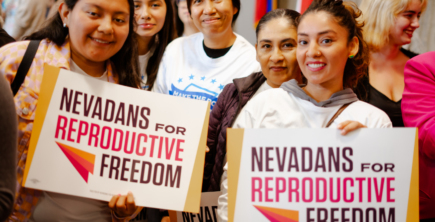
Healthy Democracy Fund
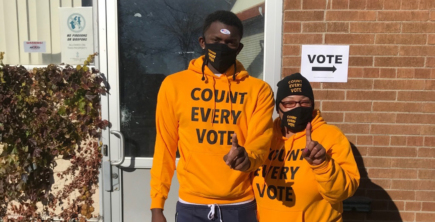

Read the stories and hear the voices of social change leaders fighting for justice.